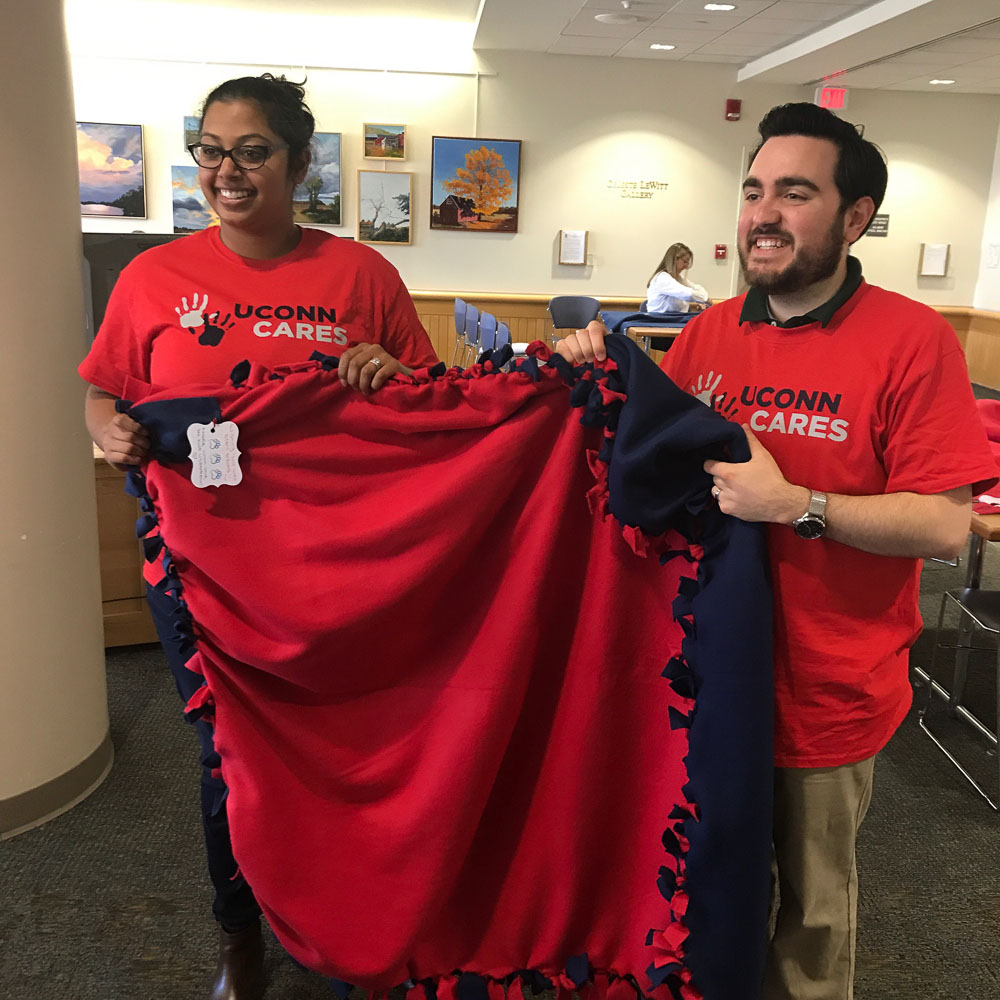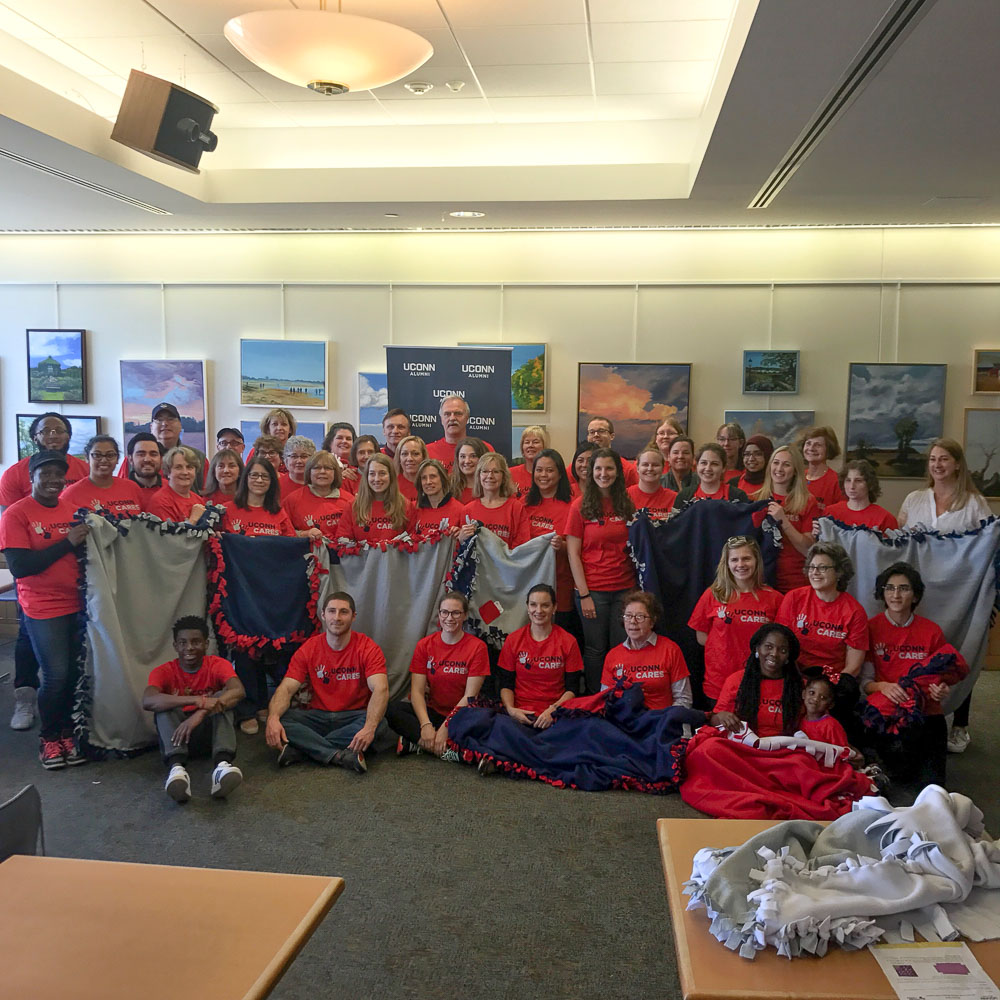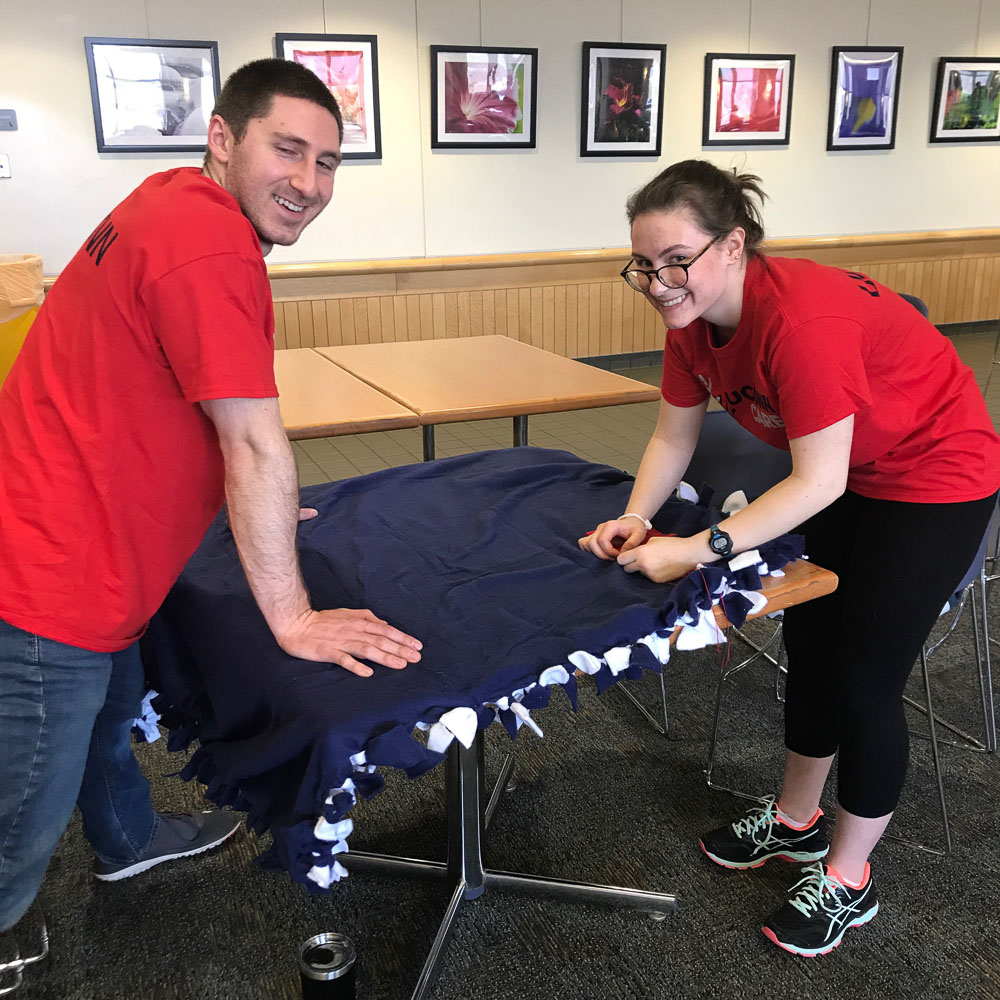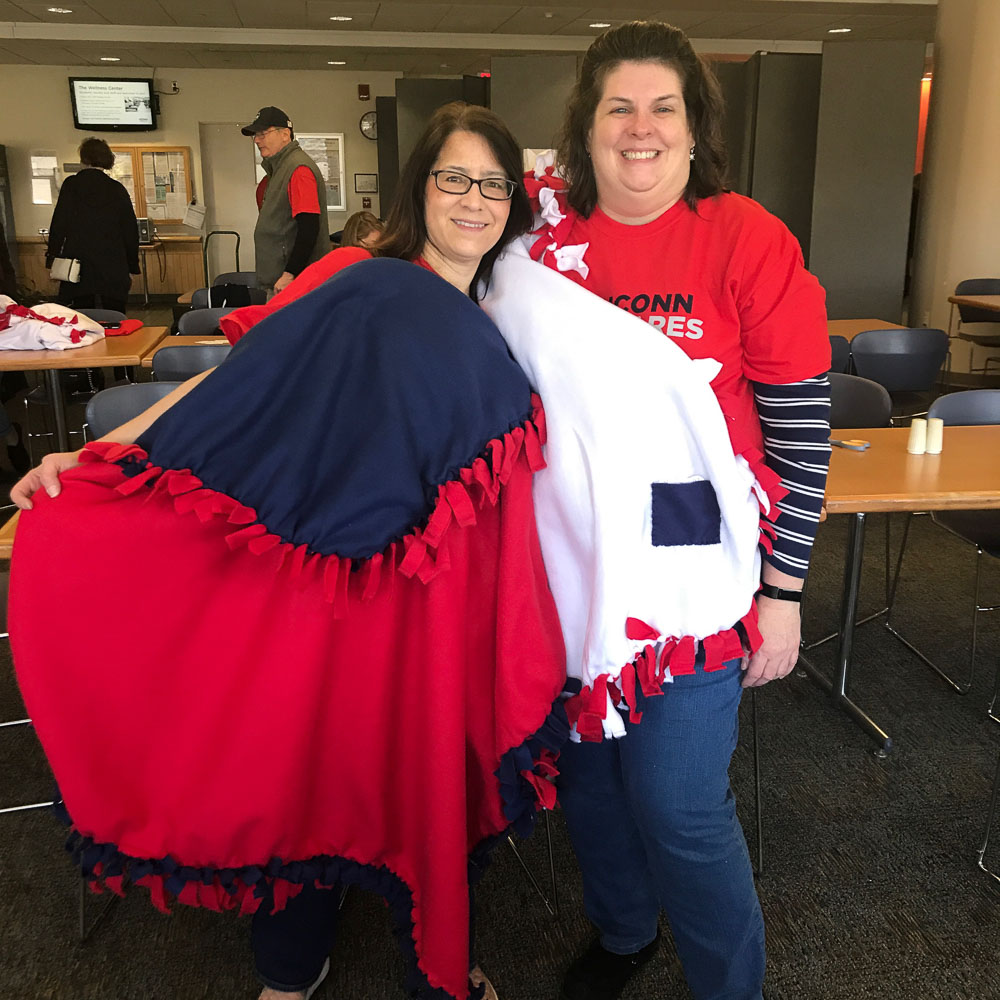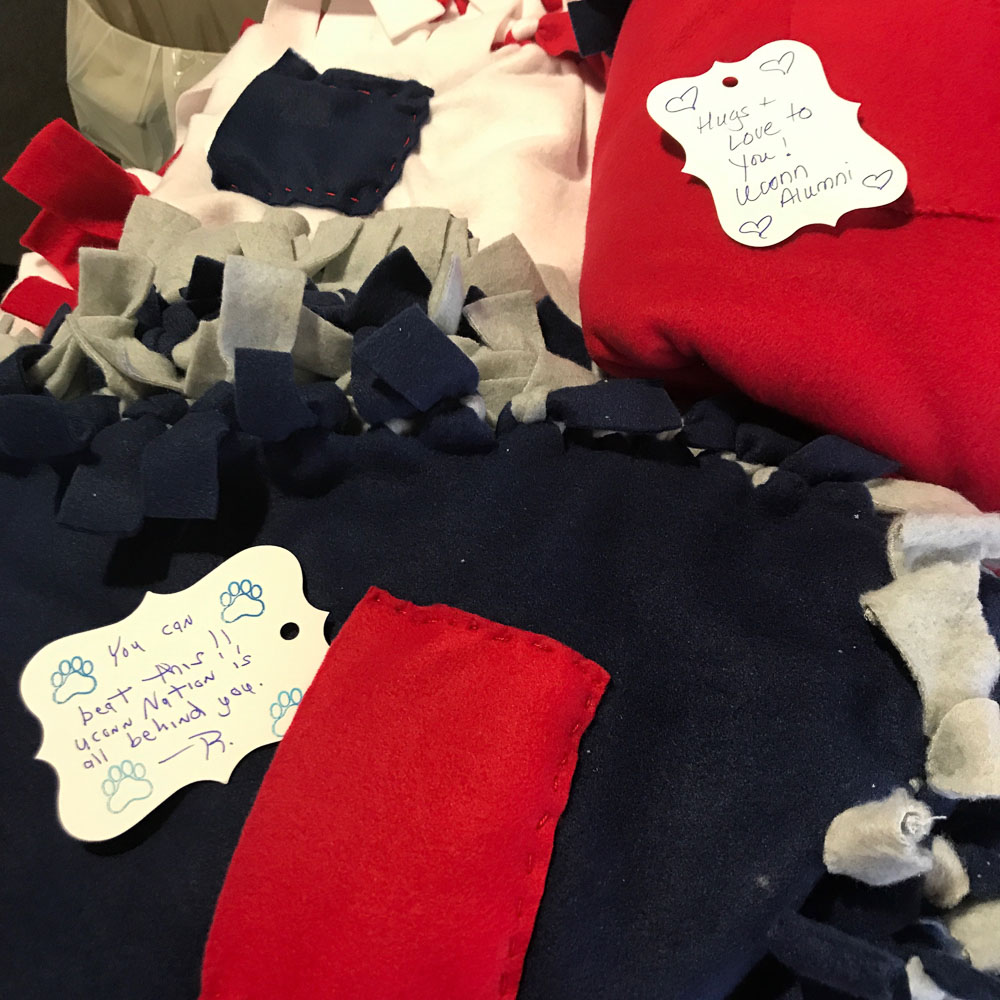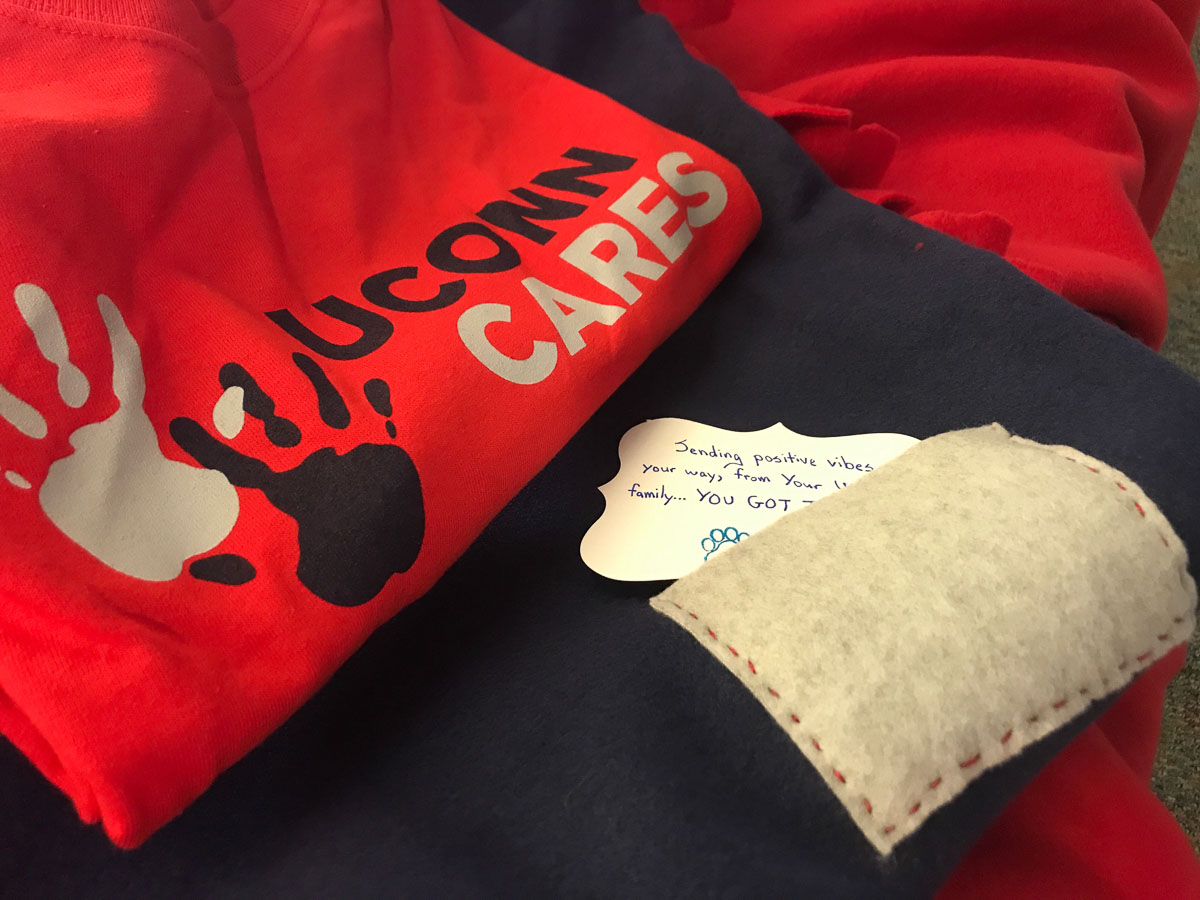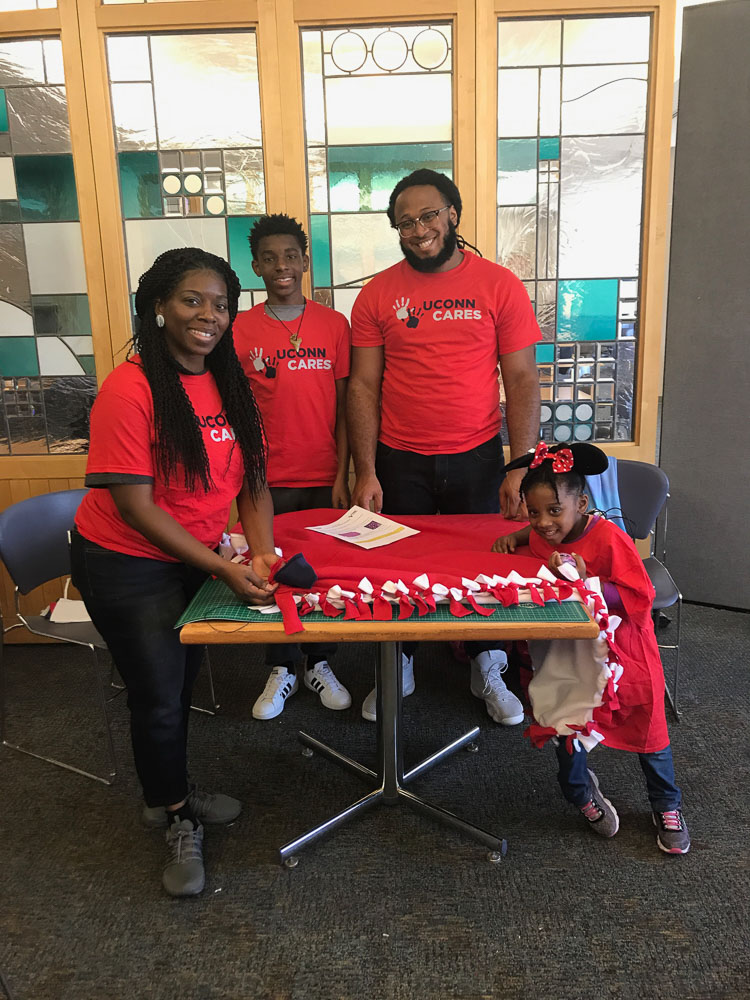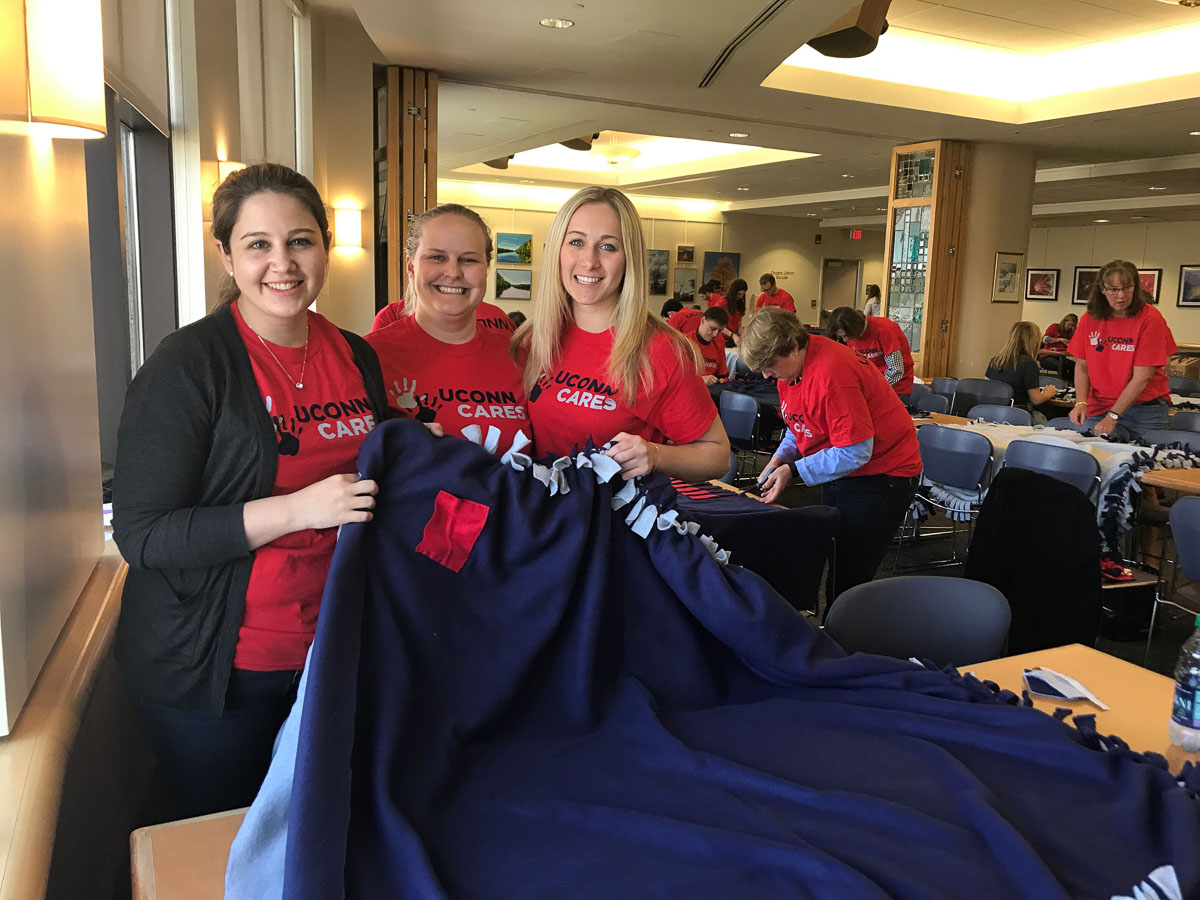In observance of National Volunteer Day and UConn Cares, UConn alumni gathered at the food court last Saturday to assemble blankets for patients at the Neag Comprehensive Cancer Center. They assembled 40 cozy fleece, no-sew blankets. It was organized by Josh Proulx from the alumni group and Liz Krueger from the UConn Foundation. Around 50 alumni volunteers and their families put together the blankets with short inspirational message cards tucked inside. Patient navigator Amber Tillinghast will distribute the blankets to patients, specifically breast cancer patients getting the Dignicap scalp-cooling treatment to reduce hair loss during chemotherapy.
Patient Care
HealthONE on TV
Have you seen the NBC Connecticut features on UConn HealthONE?
https://youtu.be/WFFev9YGDmc
https://youtu.be/Ff-9-AaE2Dg
Watch for additional HealthONE updates in Lifeline, in the Pulse, at uconnhealthexpress.uchc.edu/HealthONE, and now on Twitter @UConnHealthONE.
HealthONE Soft Go-live | Frequently Asked Questions
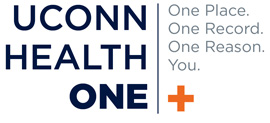 Following the appointment conversion weekend from Friday, April 6 – Sunday, April 8, 2018, UConn Health will go live with HealthONE’s scheduling application, Cadence, on Monday, April 9, 2018. The soft go-live of HealthONE’s scheduling application will impact end users who have a scheduling job function.
Following the appointment conversion weekend from Friday, April 6 – Sunday, April 8, 2018, UConn Health will go live with HealthONE’s scheduling application, Cadence, on Monday, April 9, 2018. The soft go-live of HealthONE’s scheduling application will impact end users who have a scheduling job function.
HealthONE Training Requirements
I have outstanding HealthONE training that I have not completed. Will I have access to the system at go-live?
No training. No access. No kidding. Staff who have a scheduling job function should complete their required HealthONE training by Friday, April 6, 2018. If you will not complete training by this date, please contact healthonetrainingregistration@uchc.edu.
Scheduling in HealthONE
How will staff schedule appointments with a service date that occurs on or after Saturday, April 28, 2018?
All appointments including cancellations, new and rescheduled appointments with a service date of Saturday, April 28, 2018, or beyond will be scheduled in HealthONE.
How will staff schedule appointments with service dates prior to go-live?
All appointments (cancelled, new and reschedule) with service dates prior to Saturday, April 28, 2018, will be scheduled in IDX.
Soft Go-live ‘At-the-elbow’ Support
Will there be support for staff during the soft launch?
Yes; go-live support will be provided by at-the-elbow (ATE) resources. ATE support will continue through go-live on Saturday, April 28, 2018, and will be supplemented with support from super users during go-live.
How can I identify an at-the-elbow (ATE) support person during the soft launch?
ATE support will wear black vests during the soft go-live and through the go-live. This will ensure that end users are able to easily identify resources.
Reporting Issues During Soft Go-live
How can I report a build/workflow issue during soft go-live?
Staff will be able to submit tickets for build/workflow issues through an ATE support person or by dialing 4400 option 1.
What are the hours of the command center during the soft go-live?
During soft go-live, the command center will be open Monday – Friday from 7:30 am to 5:30 pm to assist end users.
What information should I include when submitting a ticket?
- Name of affected user
- Contact information for call back (please provide a cell phone, if possible)
- Computer name
- The date/time the end user experienced the issue
- Detailed description of the issue
- Patient name, MRN and patient DOB, if applicable to the issue
General Issues and Communications
If I am unable to perform a task in HealthONE and I need to modify my scheduling template, who should I reach out to for assistance?
All template related issues should be escalated to your manager. Once escalated, your manager will determine if your template needs to be revised in order to perform your job function.
I printed a document in HealthONE, but the document did not print in my preferred location.
Beginning on Monday, April 9, documents and labels printed within HealthONE will print to the printer located nearest to the end user. If you are experiencing issues related to printing, please verify that you are logged into the correct location in HealthONE. For additional issues related to printing, please direct your questions to an ATE or call the command center.
Where can I check for updates regarding the soft go-live?
All soft go-live communications will be posted on http://uconnhealthexpress.uchc.edu/. Please bookmark this page on your computer.
HealthONE: Enabling ‘Care Everywhere’
 Care Everywhere, the interoperability application within Epic (which powers UConn HealthONE), can be used to exchange patient data with other health care institutions, including Hartford Healthcare, St. Francis and Connecticut Children’s Medical Center.
Care Everywhere, the interoperability application within Epic (which powers UConn HealthONE), can be used to exchange patient data with other health care institutions, including Hartford Healthcare, St. Francis and Connecticut Children’s Medical Center.
Today, organizations are using Care Everywhere to exchange more than 1.25 million patient records daily with other health care providers and government agencies such as the Department of Veteran Affairs, the Social Security Administration, and the Department of Defense. Information can be exchanged directly between standards-compliant EHR systems or with the help of Health Information Exchanges (HIEs) and Health Information Service Providers (HISPs).
Care Everywhere helps ensure that clinicians have the information they need to treat patients, both for unplanned transitions of care, such as visits to the emergency department, and planned transitions of care, such as referrals.
After the patient’s information goes into HealthONE, physicians can review it and reconcile discrete allergies, medications, problems, and immunizations in Care Everywhere documents with information in the patient’s local Epic chart. Reconciled data becomes a permanent part of the patient’s chart and is used to drive clinical decision support.
—From Epic UserWeb
Watch for additional HealthONE updates in Lifeline, in the Pulse, at uconnhealthexpress.uchc.edu/HealthONE, and now on Twitter @UConnHealthONE.
Spotlight on Services: Colon Cancer Prevention Program
UConn Health started its Colon Cancer Prevention Program a decade ago. Dr. Joel Levine, one of the co-founders, describes how what started as a novel approach to the disease is becoming a mainstream concept.
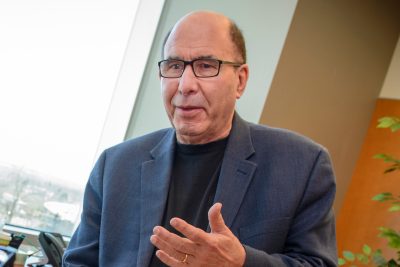
What makes the Colon Cancer Prevention Program successful?
The idea of prevention is what’s novel. There aren’t any other prevention programs that do what we do. If you Google “colon cancer prevention program,” we come out as the top listed patient centered resource.
Our process is very longitudinal. It’s not a one and done. We follow more than 6,000 people who return, at least annually, for both the latest information and for modulating their level of risk. Lowering risk is what we, the patient and Program, do. We are always learning how to do that more effectively. Indeed, we have not seen a colon cancer develop in someone who has been in the Program in about eight years. Put another way, if you come to us without colon cancer, we start by identifying risk and, then, follow you accordingly. If we reduce whatever risk level you have, we have not had a patient develop colon cancer on our watch.
The exceptions, so important to us, are patients who, on first visit, we find have colon cancer. Many patients are referred because of a positive FIT test (fecal immunochemical test). We introduced the quantitative FIT test to UConn Health and continue to study the test, over time, as an early marker for polyps or cancer. We work with the wonderful genetics group to identify those patients and families with inherited risk. Very few patients who have colon cancer in the family have actual inheritable risk (3 percent) but they are important to identify. These patients are followed closely, expecting them to develop colon cancer as a risk of their disease. We cannot as of yet prevent it in those inherited risk families, but we still can take steps to reduce risk by about half.
Prevention chose our program to feature in its “Guide to Preventing Disease” in its April issue. What do you see as the implications of that?
This is one of the largest magazine readerships in the world. The increasing recognition of a program dedicated to prevention is encouraging. Therefore we are at the tip of that spear and grateful to the Neag Comprehensive Cancer Center for supporting us from the outset.
We have a program whose purpose is to think about the disease. We are migrating from just doing colonoscopy, which is still important, to what do you do before and after the colonoscopy—how you define risk and how you then modulate the risk—and that’s prevention. In recent conversations with Dr. Dorado Brooks, who leads the colon cancer division of the national American Cancer Society, we plan to forward this more broad-based and lifelong strategy to lower the frequency and mortality of this disease. The evidence is emerging and our approach that combines the latest in scientific thought to patient care is shaping how we see the problem and solution.
What’s happening on the academic side?
We are publishing and hoping to influence thought. I just co-wrote an editorial for a leading GI journal with Dr. Joseph Anderson [former UConn Health colleague, now at Dartmouth] in which we discuss a particular type of colon cancer pathway. The emphasis is on how long it takes for that pathway to go from one level of risk to another. Young people can have polyps in that pathway but do not commonly develop colon cancer; it is only when they are much older do you see the colon cancers appear, so you have a long period of time in which the disease evolves. There are even specific risks, because this pathway involves DNA methylation, a biologic process that can silence key genes. This occurs progressively as you get older but can be increased cigarette smoking, a behavior we really fuss about. Dr. Anderson’s study of smoking risk, begun here, is very well recognized and regarded.
How has the approach to mitigating colon cancer prevention evolved over the program’s 10 years?
It’s really colonoscopy-plus, with super-sensitive blood stool testing, better understanding of the colon’s microbiome, and an ever-growing knowledge of modifiable risk factors. In this regard, Dr. Ethan Bortniker, who directs new approaches in clinical research, studies how other lifestyle factors (cardiovascular health, metabolic fat in the liver) influence colon polyps and cancer. Our patients know this and are proactive participants in their own well-being. They fastidiously stick with the program.
Overall the colon cancer attack rate is still low. If you have a 5 percent attack rate in a disease, your anxiety says, “Show me I don’t have the disease.” We hope to focus more on those who are likely the 5 percent. Early prediction of biologic and then clinical risk is the name of the game. Dr. Dan Rosenberg, who is the director of our basic research, is a leading authority and invaluable to our clinical approach. We hope to be able to understand the biology of early cancer risk and keep it from becoming a clinical reality. So far, we are making progress.
HealthONE: Secure Sign-on With Tap of Badge
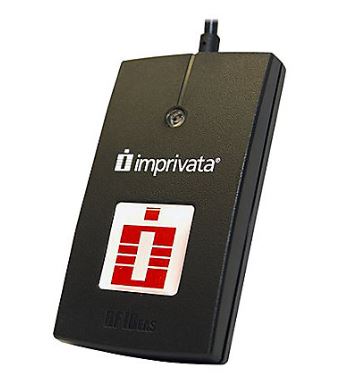
(Updated March 27)
Physicians, nurses, and other providers will be able to quickly and securely access patient records simply by tapping their badge once UConn Health activates its electronic medical record system, HealthONE, in the spring.
The technology—which the vendor, Imprivata, calls “OneSign”—uses badge readers and prompts for a password. Once the password is entered, users will be able to log in to HealthONE by tapping in and out for four hours and 15 minutes without having to provide a password again.
“Using the ID badge instead of stopping to type in a name and password [every time] enables providers to get into the patient record instantly,” says Assistant Vice President for Information Technology Michael Catrini. “Those seconds saved really add up quickly over time and more importantly, you no longer have the patient interaction interrupted or delayed by keying in a password [at every encounter].”
It also enables a more a seamless transition from one provider to the next.
“In a patient room, the record is going to be up on the screen right where the nurse or the MA left off,” says information technology project manager John Virkler. “The nurse or the MA will go in and take vitals, they’ll put all that information in, and they’ll tap their badge. It’ll sign them out but it will leave the patient record up. The screen is blank, it locks up. The provider walks in, taps his or her badge, and it’s all ready for the provider.”
The technology will go beyond the EMR software and the associated ancillary programs that make up HealthONE. Kronos is one example.
“Users who already have a single sign-on ID will not have to enter their credentials to get into Kronos either, it’ll just automatically log them in to Kronos,” Virkler says. “The application just basically puts their user ID and password into any application that’s been profiled.”
Other planned components of this technology include e-prescribing and blood draw. It’s equipped to handle two-factor authentication for circumstances like that, when having a second person sign off is required.
“On the back end we’re building it out so we could easily add other workflows as they’re identified,” Virkler says.
Training on the new technology is part of the regular HealthONE training for users.
“There’s not much to it, you tap in, you tap out, it’s that simple,” Virkler says. “Like ‘wash in, wash out,’ we want to ingrain that. We want to get them into the habit of tapping in and tapping out. If they don’t tap out, it will eventually time them out.”
The idea is to have badge readers in every clinical area, and they eventually could be used in other areas too.
Watch for additional HealthONE updates in Lifeline, in the Pulse, at uconnhealthexpress.uchc.edu/emr, and now on Twitter @UConnHealthONE.
First Stroke Thrombectomy Alert
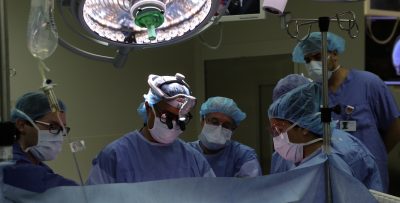
UConn John Dempsey Hospital’s Stroke Center directed by Dr. Sanjay Mittal, successfully performed its first-ever mechanical thrombectomy procedure on a patient presenting with advanced stroke symptoms in the Emergency Department last week.
The Stroke Center’s first “Stroke Thrombectomy Alert” quickly activated the Cath Lab and Anesthesia teams to prepare for Neurosurgery Chief Dr. Ketan Bulsara’s emergency thrombectomy intervention. The procedure was guided by the Radiology Department Chair Dr. Leo Wolansky and his team’s new neuroimaging CT perfusion imaging technique using RAPID software to successfully remove the stroke patient’s life-threatening clot and restore proper blood flow to the brain.
The multidisciplinary team effort included Dr. Electra Kaloudis, Dr. Gracia Mui, Dr. Ronald Burt, Dr. Brian Bullard, Ellen Benson, Jennifer Sposito, Kerri King, Kari Kriqui, Liz Drotar, Sally Briley, Mike Castagna, Dan Hannon and Elizabeth Bozzuto, along with the hospital’s ICU and second-floor care teams.
Thanks to excellent team work this patient’s life was saved from a basilar artery thrombus which has up to a 90 percent risk of mortality.
The addition of on-site thrombectomy capabilities is part of an institutional-wide initiative to improve neurological patient outcomes for complex conditions, such as stroke, by growing our team of experts, services, and cutting-edge technology.
UConn Health November 2017 Programs, Events
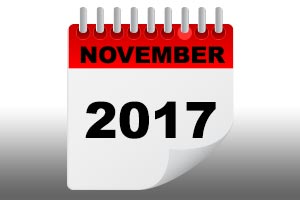 Here is a list of UConn Health programs scheduled for November and early December 2017. This information will be updated with any additions or other schedule changes.
Here is a list of UConn Health programs scheduled for November and early December 2017. This information will be updated with any additions or other schedule changes.
Breast-feeding Class
Wednesday, Nov. 1, 6 to 8 p.m., UConn Health Outpatient Pavilion, 3rd floor conference room S3301
A certified lactation consultant leads a discussion of topics including the benefits of breast-feeding, how to get started, and how the rest of the family can help the breast-feeding mother as well as how to continue breast-feeding and working. Fee is $25 per couple. Call 800-535-6232 to register or for more information. (Last updated 10/25)
UConn Health Epilepsy Support Group
Wednesday, Nov. 1, 6:30 to 8 p.m., UConn Health Outpatient Pavilion, 2nd Floor, Large Conference Room S2010
The UConn Health Department of Neurology invites those with epilepsy to a monthly group meeting surrounding life with epilepsy. Discussion topics include coping methods, support systems, and resources. The group generally meets on the first Wednesday of the month. Please call 860-679-3186 for more information.
Living Well With Epilepsy: A Support Group for Young Adults
Saturday, Nov. 4, noon to 1:30 p.m., UConn Health Outpatient Pavilion, 2nd Floor, Large Conference Room S2010
The Epilepsy Foundation of Connecticut, in partnership with the UConn Health Department of Neurology, offers a support group for young adults who live with epilepsy. This group is open to those aged 18 to 30 who would like to join others to share experience, gain peer support, and learn together about epilepsy and overcoming its challenges to live well. The group generally meets on the first Saturday of the month. Please call 860-346-1924 or email manzelone.efct@sbcglobal.net for more information.
Bladder Cancer Support Group
Saturday, Nov. 4, 2 to 3 p.m., UConn Health, Onyiuke Dining Room
Patients, family members and caregivers (not limited to UConn Health patients) are invited to join others whose lives have been touched by bladder cancer. This support group, established in partnership with the Bladder Cancer Advocacy Network, usually meets on the first Saturday of the month and is the only group of its kind in New England. Call 888-901-BCAN for more information.
Free Hospital Maternity Tours
Saturday, Nov. 11, 2 p.m., UConn Health, University Tower lobby
A representative will guide you through labor and delivery, postpartum, and the nursery at the UConn John Dempsey Hospital. Children and grandparents are welcome. Call 800-535-6232 to register or for more information.
Childbirth Preparation Class
Wednesday, Nov. 15, 6 to 10 p.m., UConn Health Outpatient Pavilion, 3rd floor conference room S3301
This one-day class covers anatomy and physiology of pregnancy and labor, emotions of pregnancy, nutrition, fetal growth and development, comfort measures for labor, working with unexpected events in labor, cesarean delivery, and practice of relaxation and breathing techniques for labor. Class size is limited to eight couples. Remember to bring two pillows and wear comfortable clothing. Light snack is provided. Fee is $100. Call 800-535-6232 or 860-679-7692 to register or for more information.
Living With Heart Disease Meeting
Thursday, Nov. 16, 11 a.m. to noon, UConn Health, University Tower, 2nd floor conference room
Men and women affected by heart disease meet on the third Thursday of the month to discuss post-diagnosis topics such as prevention and wellness, social and emotional support, heart-healthy recipes, coping strategies and resources. Please call Sue at 860-679-3633 for more information.
Breast Cancer Support Group
Thursday, Nov. 16, 7 to 8 p.m., UConn Health, Onyiuke Dining Room
This is a support group intended for women under the age of 45 who’ve been diagnosed with non-metastatic breast cancer. Women at any point in their cancer survivorship journey are welcome. Meetings are the third Thursday of the month. To register or more information, call 860-679-7820 or email tillinghast@uchc.edu.
Infertility Peer Support Group
Thursday, Nov. 16, 7 p.m., Center for Advanced Reproductive Services, 2 Batterson Park Road, Farmington.
The Greater Hartford chapter of RESOLVE, a national nonprofit resource for those facing the challenges of infertility, offers support, information and confidential, informal, peer-led discussions on the third Thursday of the month. To learn more or to check for weather-related cancellation, call 860-523-8337.
Celiac Disease Nutrition Class
Monday, Nov. 20, 8 to 9 a.m., UConn Health Outpatient Pavilion
A registered dietitian leads a discussion for those with celiac disease or non-celiac gluten sensitivity. This program now is scheduled to meet the third Monday of the month. A physician’s referral is required. Fee is $20. Call 860-679-3245 more information.
(Canceled 10/25)
Stroke Survivor Group
Wednesday, Nov. 22, noon to 1 p.m., UConn Health Outpatient Pavilion, 3rd floor
The UConn Health Stroke Center invites stroke survivors, families and caregivers to a monthly group meeting to discuss topics such as prevention, coping methods, support systems, rehabilitation tips, resources, and promoting independence. The Stroke Survivor Group generally meets on the fourth Wednesday of the month. Call 860-679-4846 for more information.
Free Workshop: “Things to Consider Before Joining a Research Study”
Monday, Nov. 27, 5 p.m., UConn Health, Onyiuke Dining Room
The UConn Health Human Subjects Protection Office offers an educational session about the rights and responsibilities of participants in research projects on the last Monday of the month. Registration is required: 860-679-8802 or cagganello@uchc.edu.
Living Well With Epilepsy: A Support Group for Young Adults
Saturday, Dec. 2, noon to 1:30 p.m., UConn Health Outpatient Pavilion, 2nd Floor, Large Conference Room S2010
The Epilepsy Foundation of Connecticut, in partnership with the UConn Health Department of Neurology, offers a support group for young adults who live with epilepsy. This group is open to those aged 18 to 30 who would like to join others to share experience, gain peer support, and learn together about epilepsy and overcoming its challenges to live well. The group generally meets on the first Saturday of the month. Please call 860-346-1924 or email manzelone.efct@sbcglobal.net for more information.
Free Hospital Maternity Tours
Saturday, Dec. 2, 2 p.m., UConn Health, University Tower lobby
A representative will guide you through labor and delivery, postpartum, and the nursery at the UConn John Dempsey Hospital. Children and grandparents are welcome. Call 800-535-6232 to register or for more information.
Bladder Cancer Support Group
Saturday, Dec. 2, 2 to 3 p.m., UConn Health, Onyiuke Dining Room
Patients, family members and caregivers (not limited to UConn Health patients) are invited to join others whose lives have been touched by bladder cancer. This support group, established in partnership with the Bladder Cancer Advocacy Network, usually meets on the first Saturday of the month and is the only group of its kind in New England. Call 888-901-BCAN for more information.
Childbirth Preparation Class
Wednesday, Dec. 6, 6 to 10 p.m., UConn Health Outpatient Pavilion, 3rd floor conference room S3301
This one-day class covers anatomy and physiology of pregnancy and labor, emotions of pregnancy, nutrition, fetal growth and development, comfort measures for labor, working with unexpected events in labor, cesarean delivery, and practice of relaxation and breathing techniques for labor. Class size is limited to eight couples. Remember to bring two pillows and wear comfortable clothing. Light snack is provided. Fee is $100. Call 800-535-6232 or 860-679-7692 to register or for more information.
UConn Health Epilepsy Support Group
Wednesday, Dec. 6, 6:30 to 8 p.m., UConn Health Outpatient Pavilion, 2nd Floor, Large Conference Room S2010
The UConn Health Department of Neurology invites those with epilepsy to a monthly group meeting surrounding life with epilepsy. Discussion topics include coping methods, support systems, and resources. The group generally will meet on the first Wednesday of the month. Please call 860-679-3186 for more information.
Breast-feeding Class
Tuesday, Dec. 12, 6 to 8 p.m., UConn Health Outpatient Pavilion, 3rd floor conference room S3301
A certified lactation consultant leads a discussion of topics including the benefits of breast-feeding, how to get started, and how the rest of the family can help the breast-feeding mother as well as how to continue breast-feeding and working. Fee is $25 per couple. Call 800-535-6232 to register or for more information.
Directions to UConn Health are available at http://bit.ly/get2uch.
Cancer Survivors Day at UConn Health Marks 20 Years
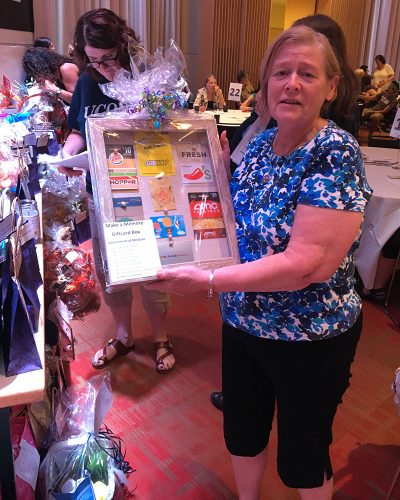
The Carole and Ray Neag Comprehensive Cancer Center celebrated its 20th Cancer Survivors Day on Sunday, Sept. 24 in the Academic Rotunda at UConn Health. The focus of the event was how you can make simple changes to your diet and exercise routine that will help you lead a healthier lifestyle.
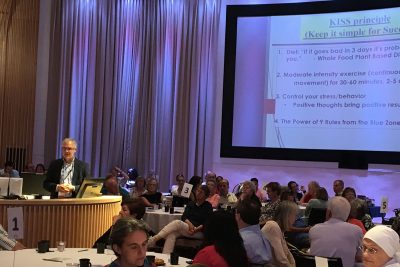
The event kicked off with Dr. Susan Tannenbuam, division chief of Hematology and Medical Oncology, telling the many survivors and their families that, “you are the most important people in the room and we are all here for you.” She then introduced Dr. Elektra Kaloudis, section head of Thoracic Imaging at UConn Health, who bravely shared her cancer journey and how she pushed through the scary times by focusing on her young children.
Dr. Kaloudis was followed by Brad Biskup, the physician assistant leading the Lifestyle Medicine Program at UConn Health. Biskup discussed some simple diet and exercise changes you can make that will lead to a healthier you.

Terry Walters, a local author of the book “Eat Clean Live Well,” held a cooking demonstration to prove that, with a little bit of planning, you can prepare healthy and tasty snacks.
Norm (Craig) Smith, a breast cancer survivor, said the speakers resonated with him since he’s been working to get back into shape and eat better. “These presentations really helped us with the tools we need to kick start that process. Taking one step at a time towards healthy foods and getting more active are the two take-aways we heard.”
Survivors were also treated to a raffle in which numerous departments at UConn Health and Storrs campus, local businesses, and individuals generously donated gift baskets, gift cards and services.
UConn Health September 2017 Programs, Events
 Here is a list of UConn Health programs scheduled for September and early October 2017. This information will be updated with any additions or other schedule changes. (Updated 9/18)
Here is a list of UConn Health programs scheduled for September and early October 2017. This information will be updated with any additions or other schedule changes. (Updated 9/18)
Living Well With Epilepsy: A Support Group for Young Adults
Saturday, Sept. 2, noon to 1:30 p.m., UConn Health Outpatient Pavilion, 2nd Floor, Large Conference Room S2010
The Epilepsy Foundation of Connecticut, in partnership with the UConn Health Department of Neurology, offers a support group for young adults who live with epilepsy. This group is open to those aged 18 to 30 who would like to join others to share experience, gain peer support, and learn together about epilepsy and overcoming its challenges to live well. The group generally meets on the first Saturday of the month. Please call 860-346-1924 or email manzelone.efct@sbcglobal.net for more information.
Bladder Cancer Support Group
Saturday, Sept. 2, 2 to 3 p.m., UConn Health, Onyiuke Dining Room
Patients, family members and caregivers (not limited to UConn Health patients) are invited to join others whose lives have been touched by bladder cancer. This support group, established in partnership with the Bladder Cancer Advocacy Network, usually meets on the first Saturday of the month and is the only group of its kind in New England. Call 888-901-BCAN for more information.
UConn Health Epilepsy Support Group
Wednesday, Sept. 6, 6:30 to 8 p.m., UConn Health Outpatient Pavilion, 2nd Floor, Large Conference Room S2010
The UConn Health Department of Neurology invites those with epilepsy to a monthly group meeting surrounding life with epilepsy. Discussion topics include coping methods, support systems, and resources. The group generally meets on the first Wednesday of the month. Please call 860-679-3186 for more information.
Free Hospital Maternity Tours
Saturday, Sept. 9, 2 p.m., UConn Health, University Tower lobby
A representative will guide you through labor and delivery, postpartum, and the nursery at the UConn John Dempsey Hospital. Children and grandparents are welcome. Call 800-535-6232 to register or for more information.
Childbirth Preparation Class
Wednesday, Sept. 13, 6 to 10 p.m., UConn Health Outpatient Pavilion, 3rd floor conference room S3301
This one-day class covers anatomy and physiology of pregnancy and labor, emotions of pregnancy, nutrition, fetal growth and development, comfort measures for labor, working with unexpected events in labor, cesarean delivery, and practice of relaxation and breathing techniques for labor. Class size is limited to eight couples. Remember to bring two pillows and wear comfortable clothing. Light snack is provided. Fee is $100. Call 800-535-6232 or 860-679-7692 to register or for more information.
Celiac Disease Nutrition Class
Monday, Sept. 18, 8 to 9 a.m., UConn Health Outpatient Pavilion
A registered dietitian leads a discussion for those with celiac disease or non-celiac gluten sensitivity. This program now is scheduled to meet the third Monday of the month. A physician’s referral is required. Fee is $20. Call 860-679-3245 more information.
New 6-week “Ready to Lose” Weight Management Program Starts
Tuesday, Sept. 19, 5 to 6 p.m., UConn Health Outpatient Pavilion, 2nd floor east
The introductory session is followed by five weekly sessions through Tuesday, Oct. 24, that include a weigh-in, discussion of progress, and a timely nutrition topic such as eating out strategies, cooking light and right, emotional eating, exercise and activity, and smart shopping. Registration fee is $70, $50 for past participants. Call 800-535-6232 or 860-679-7692 for more information.
Breast-feeding Class
Wednesday, Sept. 20, 7 to 9 p.m., UConn Health Outpatient Pavilion, 3rd floor conference room S3301
A certified lactation consultant leads a discussion of topics including the benefits of breast-feeding, how to get started, and how the rest of the family can help the breast-feeding mother as well as how to continue breast-feeding and working. Fee is $25 per couple. Call 800-535-6232 to register or for more information.
Living With Heart Disease Meeting
Thursday, Sept. 21, 11 a.m. to noon, UConn Health, University Tower, 2nd floor conference room
Men and women affected by heart disease meet on the third Thursday of the month to discuss post-diagnosis topics such as prevention and wellness, social and emotional support, heart-healthy recipes, coping strategies and resources. Please call Sue at 860-679-3633 for more information.
Breast Cancer Support Group
Thursday, Sept. 21, 7 to 8 p.m., UConn Health, Onyiuke Dining Room
This is a support group intended for women under the age of 45 who’ve been diagnosed with non-metastatic breast cancer. Women at any point in their cancer survivorship journey are welcome. Meetings are the third Thursday of the month. To register or more information, call 860-679-7820 or email tillinghast@uchc.edu.
Infertility Peer Support Group
Thursday, Sept. 21, 7 p.m., Center for Advanced Reproductive Services, 2 Batterson Park Road, Farmington.
The Greater Hartford chapter of RESOLVE, a national nonprofit resource for those facing the challenges of infertility, offers support, information and confidential, informal, peer-led discussions on the third Thursday of the month. To learn more or to check for weather-related cancellation, call 860-523-8337.
Free Workshop: “Things to Consider Before Joining a Research Study”
Monday, Sept. 25, 5 p.m., UConn Health, Onyiuke Dining Room
The UConn Health Human Subjects Protection Office offers an educational session about the rights and responsibilities of participants in research projects on the last Monday of the month. Registration is required: 860-679-8802 or cagganello@uchc.edu.
Stroke Survivor Group
Wednesday, Sept. 27, noon to 1 p.m., UConn Health Outpatient Pavilion, 3rd floor
The UConn Health Stroke Center invites stroke survivors, families and caregivers to a monthly group meeting to discuss topics such as prevention, coping methods, support systems, rehabilitation tips, resources, and promoting independence. The Stroke Survivor Group generally meets on the fourth Wednesday of the month. Call 860-679-4846 for more information.
Free Hospital Maternity Tours
Saturday, Sept. 30, 2 p.m., UConn Health, University Tower lobby
A representative will guide you through labor and delivery, postpartum, and the nursery at the UConn John Dempsey Hospital. Children and grandparents are welcome. Call 800-535-6232 to register or for more information.
UConn Health Epilepsy Support Group
Wednesday, Oct. 4, 6:30 to 8 p.m., UConn Health Outpatient Pavilion, 2nd Floor, Large Conference Room S2010
The UConn Health Department of Neurology invites those with epilepsy to a monthly group meeting surrounding life with epilepsy. Discussion topics include coping methods, support systems, and resources. The group generally will meet on the first Wednesday of the month. Please call 860-679-3186 for more information.
(Updated 9/18–Rescheduled to Oct. 25)
Childbirth Preparation Class
Saturday, Oct. 7, 8:30 a.m. to 12:30 p.m., UConn Health Outpatient Pavilion, 3rd floor conference room S3301
This one-day class covers anatomy and physiology of pregnancy and labor, emotions of pregnancy, nutrition, fetal growth and development, comfort measures for labor, working with unexpected events in labor, cesarean delivery, and practice of relaxation and breathing techniques for labor. Class size is limited to eight couples. Remember to bring two pillows and wear comfortable clothing. Light snack is provided. Fee is $100. Call 800-535-6232 or 860-679-7692 to register or for more information.
Living Well With Epilepsy: A Support Group for Young Adults
Saturday, Oct. 7, noon to 1:30 p.m., UConn Health Outpatient Pavilion, 2nd Floor, Large Conference Room S2010
The Epilepsy Foundation of Connecticut, in partnership with the UConn Health Department of Neurology, offers a support group for young adults who live with epilepsy. This group is open to those aged 18 to 30 who would like to join others to share experience, gain peer support, and learn together about epilepsy and overcoming its challenges to live well. The group generally meets on the first Saturday of the month. Please call 860-346-1924 or email manzelone.efct@sbcglobal.net for more information.
Bladder Cancer Support Group
Saturday, Oct. 7, 2 to 3 p.m., UConn Health, Onyiuke Dining Room
Patients, family members and caregivers (not limited to UConn Health patients) are invited to join others whose lives have been touched by bladder cancer. This support group, established in partnership with the Bladder Cancer Advocacy Network, usually meets on the first Saturday of the month and is the only group of its kind in New England. Call 888-901-BCAN for more information.
Directions to UConn Health are available at http://bit.ly/get2uch.
